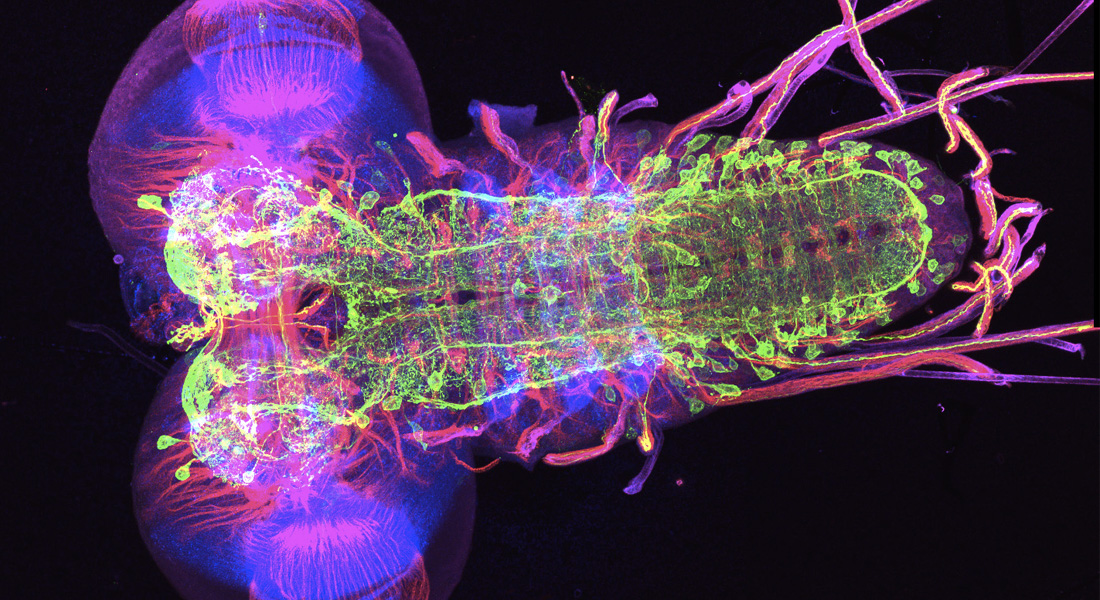Endocrinology and Metabolism Lab

Internal organs of animals serve tissue-specific functions and continuously exchange information through a network of hormonal signals. Organ-to-organ signaling networks coordinate whole-organism physiology and thus maintain body-wide homeostasis. Communication between organs is mediated by a variety of long-distance signals, such as cytokines and hormones, that are secreted from different organs and carried in the circulatory system to receptive target tissues, where they regulate metabolism and physiology.
We are interested in the mechanisms by which organs such as the gut sense changes in the external and internal environment and relay information to the brain and other tissues to adjust food intake, energy storage, metabolism, growth, and behavior. The fruit fly Drosophila offers the most practical system to investigate organ crosstalk in body-wide coordination of processes affecting health and disease. We use tissue-specific genome-wide RNAi screening and new genetic tools such as tissue-specific CRISPR-based “genome editing” combined with cutting edge transcriptomics and proteomics to investigate inter-organ communication.
Gut signaling in development and metabolism
The intestine is the largest endocrine organ and the site where ingested nutrients are entering the body. Nutritional value is sensed in the gut and relayed to other tissues via gut-secreted hormonal signals that adjust food intake, energy storage, metabolism, and growth. We are combining cutting-edge advances in “omics” technologies with new bioinformatics approaches, together with the genome-wide genetic flexibility offered by Drosophila, to define endocrine circuits underlying organ-to-organ communication between the gut, fat tissue, muscle, and brain to identify and characterize inter-organ signals and their interactions that coordinate organ-specific functions to maintain energy balance. This work will lead toward a better understanding of organ crosstalk that ensures energy homeostasis and underlies the complex etiology of metabolic disorders, with the aim of identifying new strategies for the prevention or treatment of diabetes and obesity.
Gut-brain signaling and mental health
Gut health is intimately linked to mental health. The gut microbiome is important for mental-well-being, indicating that inter-organ signaling from the gut to the brain plays an important role in mental function. The gut-to-brain communication system involves the gut’s sensation of its food and microbiotic contents and its overall health, and the release of hormones from the gut that convey this information to the brain. The powerful genetic tools available in Drosophila, along with this organism’s repertoire of complex and evolutionarily conserved behaviors, allow the identification of gut-derived neuroregulatory signals that influence behaviors related to psychiatric disorders. Our goal is to gain new insight into the links between the gut and psychiatric disorders, which may be used to develop new therapeutic approaches.
Hormonal and nutritional signals that control organismal and cellular growth
Organisms adapt their growth and development to the nutritional conditions of their environment. The ability to sense and respond to changes in the nutritional landscape is essential for organisms to couple growth to nutrient intake. The conserved Target of Rapamycin (TOR) kinase is the main intracellular nutrient sensor that regulates cell-autonomous growth in multicellular organisms. Together with Insulin and Insulin-like growth factors (IGFs), which are the main long-range hormonal signals that systemically regulate growth, the TOR pathway links nutrient intake to body growth during development. Emerging evidence indicates that cholesterol is also an important regulator of cell growth and that this nutrient plays a role in the progression of certain cancer types. We are investigating the molecular mechanisms that link dietary cholesterol to cellular and systemic growth via TOR-dependent cholesterol sensing and the modulation of Insulin/IGF signaling. This will provide a basis for understanding the links between dietary nutrients such as cholesterol, molecular nutrient-sensing mechanisms, and growth-regulatory hormonal signaling, that together control cellular and organismal growth in development, cancer, and metabolic disorders.
See publications at PubMed here.
Work in progress
Members
| Name | Title | Phone | |
|---|---|---|---|
| Alina Malita | Postdoc | +4535331447 | |
| Kim Rewitz | Professor | +4535330155 | |
| Mette Lassen | Postdoc | +4535333834 | |
| Michael James Texada | Postdoc | +4535335246 | |
| Olga Kubrak | Postdoc | +4535324640 |
Contact
The Endocrinology and Metabolism Lab
Section for Cell and Neurobiology
Universitetsparken 15
DK-2100 Copenhagen Ø, Denmark
Professor Kim Rewitz
Email: kim.rewitz@bio.ku.dk
Phone: +45 3533 0155
Mobile: +45 6165 6026
